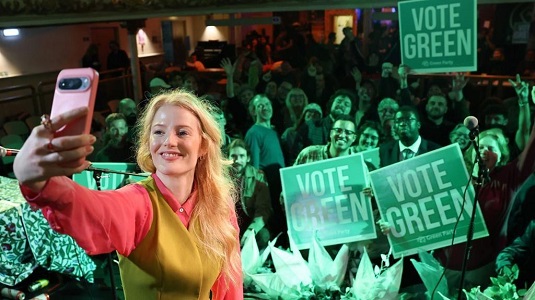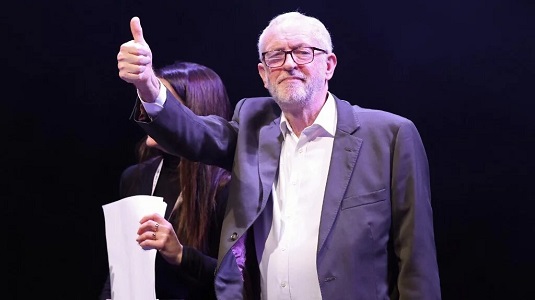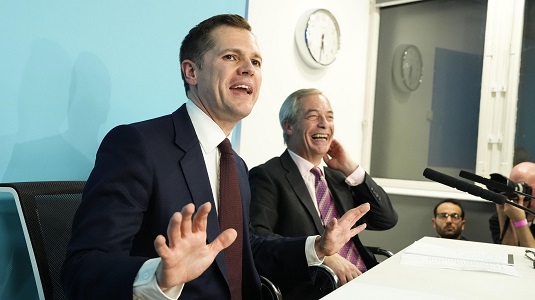
What a fantastic week. Peter Mandelson toasted to charcoal, the government being forced to make public all communications about him, the possibility of massive reputational damage hitting Wes Streeting when private messages between the pair come out, and capping it off Morgan McSweeney falls on his sword. Rare are the times when the doings of the worst people in politics catches up with them, but this is one such spectacular occasion.
It's not true that McSweeney was the most malignant presence in the contemporary Labour Party, because we found out that he willingly, happily had his strings pulled by Mandelson. We've learned that Uncle Peter had a hand in nodding through and barring candidates for selection ahead of the general election, displaying the customary contempt for data protection laws that the Labour right normally has for their own party rules. And that Mandelson effectively reshuffled the cabinet after Angela Rayner's departure, ensuring a leadership team more right wing and authoritarian than anything Mandelson had a hand in during the New Labour years.
That McSweeney, like large chunks of the Labour right, lionised Mandelson is common knowledge, but why? As argued here previously, McSweeney is no genius, and was only ever an "operator" when he was secure in a position of unaccountable power. McSweeney was Mandelson's apprentice, and only ever approached his master in cynicism and mendacity. His actual achievements are somewhat lesser, and among them one can count hollowing Labour out before it entered government, relying on antipathy to the Tories and the split right wing vote to win an election, and securing a weaker public endorsement than Jeremy Corbyn managed in 2019. It is under his direction that the party's support has eroded to a historical nadir, to the point where Labour's actual liquidation is on the cards, and McSweeney's relentlessly racist push on immigration has boosted the extreme right.
Obviously, none of this happened without the nod from Uncle Peter. But there is a significant difference between the two. Mandelson, like Blair and Gordon Brown, were political. Working their way up and through the party in the 1980s demanded skill, of knowing the balance of factions, the importance of the unions, the strength of the fiefdoms in the apparat, how to play to constituency parties and, where necessary, deploy political arguments to secure quiescence from opponents and find new allies. This isn't to say Labour was a nice place, far from it. But it was an institution that was significantly more than a bureaucracy for organising campaigning teams, which is what the party has become. New Labour was not inevitable, and Blair, Brown, and Mandelson had to win political fights to win the leadership and push it further to the right. The problem was they created a desert and called it peace. By battling and clearing out the left, and reducing trade unions to piggy banks that would occasionally complain but never rock the boat, successive generations of councillors, MPs, internal office seekers, and party full-timers came of age when the party was becalmed. Even in the Iraq War did little to nothing to challenge the leadership's writ.
This was the Labour Party McSweeney joined in 2001. He did the unglamorous hard yards of carrying bags, drawing up countless road groups, knocking on doors, all the things that party campaigning staff are expected to do. And, as we know, he organised campaigns too. But internal struggle? He undoubtedly listened to what Mandelson told him, heard all the stories of 1980s shenanigans from the John Spellar/constituency bore wing of the party. There will be a copy of John Golding's The Hammer of the Left lying around somewhere, but he never actually lived it. And that showed when the 2015 Labour leadership election rolled around, and his campaign - the Liz Kendall effort - mustered only four per cent of the vote. He, nor Kendall, hadn't realised that New Labourism had no base in the party outside of sections of the PLP, the bureaucracy, and the leaders' offices of a couple of tame unions. The lesson McSweeney took from this was not to wage a political struggle to make these positions popular, as the evidence of his own eyes showed he was completely clueless on this front. Instead, to defeat the left and return Labour back to its rightful professional/managerial leadership cadre, there was only one thing for it: lying.
If McSweeney has a genuine talent, it's as a con man. Because McSweeney and mates couldn't resist telling all and sundry about how clever he was, we know he ran Labour Together as a Janus-faced operation. Outwardly a soft left can't-we-all-just-get-along kumbya outfit, in reality it was a front for organising hit jobs on left wingers, left wing publications, of providing friendly media with copy targetting party members and the leadership, and once Corbyn was gone it, despite denials, ran Keir Starmer's leadership campaign - a confidence trick in which every single one of his pledges turned out to be a lie. And once McSweeney was at the top of the tree, the power of the bureaucracy was turned against the left. No persuasion, no alliance-building across party constituencies. Nothing but a petty-minded, vindictive pursuit of real and imagined enemies. There was never anything "genius" about any of this. Wielding power against the small and weak is the easiest thing in the world.
The rest is history. They say that if you wait by the river long enough, the bodies of your enemies come floating past. Many people across the labour movement have waited decades for Mandelson's cadaver to bob along with the current. And dragged in his wake is the fast festering foulness of McSweeney's former career. But unfortunately for the survivors of this last week, the damage these pair have done is so great, the dispersion of their natural constituency and core support so advanced, that something else is teetering on the bank further upstream and looks certain to topple into the water. And that is the swaying, barely-living figure of the Labour Party itself.
Image Credit








